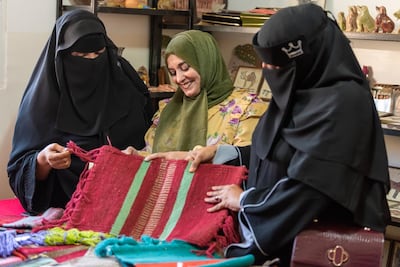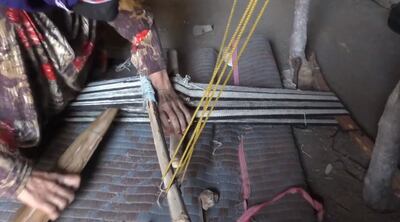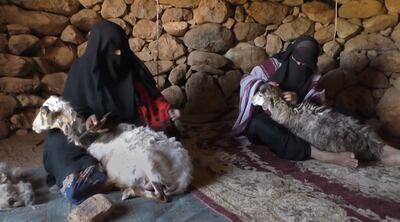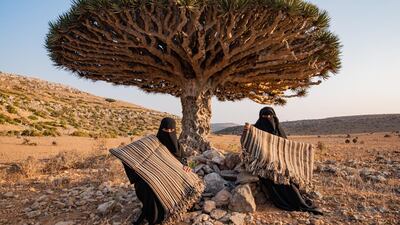Shaikhah Soliman and Ahdab Al Ameri each cradle a goat in their arms and gently cut off tufts of fur.
Later, they will thread it into spools of wool, before dyeing and weaving the coloured threads into a patterned carpet.
It's a centuries-old technique that the women, from Socotra, have been carrying out since childhood, and the duo are hoping it will remain long after their lifetimes.
As tourism to the Yemeni island increases, the two women are keen to showcase Socotra's traditional crafts. They opened the island's first handicrafts shop 10 years ago but are now seeking to reach a wider audience, with the aim of preserving traditional techniques.
Last month, Shaikhah, 39, and Ahdab, 36, were invited, along with other members of the Socotra Heritage Project team, to Amman to participate in a training programme organised by Jordan's Royal Society for the Conservation of Nature and the Royal Botanic Garden Edinburgh.
The intensive 18-day workshop was part of an initiative that seeks to promote sustainable development in Socotra while conserving the island's nature.
The workshop was part of a sustainable management programme run by the RSCN and RBGE on the Yemeni island. The main purpose of this collaboration was for Jordan's reserves to provide the Yemeni group with an on-the-ground insight into how to manage protected areas and to help develop their field experience.
The Yemeni women became involved in the preservation of culture 10 years ago when they worked together on a project that helped them set up a handicrafts shop for tourists.
With the aim of preserving the island's unique cultural heritage, they continued their interest by setting up workshops in the governorates of Hadiboh and Qalansiyah, which they now head.
“We have seen many workshops for handicrafts that have been established in the reserves as part of the socio-economic development programme for local communities,” said Shaikhah.
“Most of the workers were women from the local community.”
Over the course of the workshops, similarities in the crafting traditions of Jordan and Socotra emerged. But what impressed the Socotri women the most was the ability of the Jordanian women to produce high-quality crafts and market them locally and internationally.
Traditional carpet making in Jordan, like Socotra, uses a ground loom and natural products for dyeing the wool, although in many cases the natural colours of white and brown were used. Yemeni geographer Muhammad Al Hamdani, Socotri rugs and carpets were renowned for their quality, and formed one of Socotra’s primary exports, as far back as the 10th century.
“Carpets made on Socotra were recorded as being sold throughout the Indian Ocean from as far as the 13th century, owing to the better quality of the sheep that reflects in the quality of wool,” said archaeologist Julian Jansen van Rensburg, from the Socotra Heritage Project.
“Socotri wool has long been versatile, from making thick and hard carpets to place over the roof of their houses to stop wind and rain during the winter, to nice soft ones to wrap babies in.”
Making and selling Socotri crafts abroad is a goal that occupies the women's minds, and meeting with the Jordanians gave them valuable insight on how to achieve that, while preserving heritage and identity.
“We saw how their work has provided income-generating job opportunities in areas where opportunities are few for women in particular,” said Ahdab.
They were mostly impressed by how the Jordanian women modified some crafts to suit the requirements of the modern generation by making bags, carpets and pottery of different sizes in less traditional colours.
Their visit to Jordan's RSCN workshop reaped many valuable lessons for the women. They are now more determined than ever to overcome the many challenges ahead as residents of one of the most rudimentary islands in the region. “Jordan has made great strides in integrating the natural heritage with the cultural heritage,” said Shaikhah.
“The pottery which they manufacture using modern methods, now bear images of archaeological inscriptions, animals and plants native to their country, a practice we would like to implement in Socotra.”
Challenges remain
The small island of Socotra, about 340 kilometres south-west of Yemen, has long been known for its centuries-old, umbrella-shaped dragon blood trees, but changing temperatures and rising sea waters are putting its ecology, heritage and cultural traditions under threat.
Home to more than 60,000 people, it has remained relatively untouched by Yemen’s civil war, with Unesco describing the main island as one of the world’s “most biodiversity-rich and distinct”.
The war in Yemen, between the Houthis and pro-government forces backed by a Saudi-led coalition, since 2015 has only made the situation on the island more dire.
Traditionally, weaving on Socotra has been undertaken exclusively by women, who use a horizontal ground loom. These looms have been in use from approximately 4400BC, according to historical accounts, and are suited to the early nomadic lifestyle of the Socotri Bedouin.
“Traditional crafts of Socotra have a value that could contribute to development and livelihoods on the islands,” said Dr Alan Forrest, who works at the Centre for Middle Eastern Plants, part of Edinburgh's Royal Botanic Garden.
Yet, the biggest challenge that faces the Socotri women is the means to market, manufacture in larger numbers and export their goods.
Besides the bad internet connection, which makes online marketing, branding and selling near impossible, Shaikhah and Ahdab are trying to recruit the older women in the community to come into the institute a couple of times a month to pass on to younger generations the traditional crafting methods.
“Shaikhah and Ahdab are trying to grow the market beyond tourists in Socotra. We at the Socotra Heritage project are only there to assist and provide whatever help and advice they may need,” Dr Forrest said.
“They want to generate money and income that is supported and generated locally.” As such, the duo are not willing to give up on traditional design and techniques, and have refused to rely on modern sewing machines.
While the Socotra Heritage Project has been supported by the British Council since 2017, Shaikhah and Ahdab have been doing all of the heavy lifting.
“We don't do the work — it's about them. It's about their passion and dedication to preserve their heritage, we support them and their ideas and we try to fund them,” Dr Forrest said.
“It’s all there — they are waiting, they just need the means.”
Zayed Sustainability Prize
Iraq negotiating over Iran sanctions impact
- US sanctions on Iran’s energy industry and exports took effect on Monday, November 5.
- Washington issued formal waivers to eight buyers of Iranian oil, allowing them to continue limited imports. Iraq did not receive a waiver.
- Iraq’s government is cooperating with the US to contain Iranian influence in the country, and increased Iraqi oil production is helping to make up for Iranian crude that sanctions are blocking from markets, US officials say.
- Iraq, the second-biggest producer in the Organization of Petroleum Exporting Countries, pumped last month at a record 4.78 million barrels a day, former Oil Minister Jabbar Al-Luaibi said on Oct. 20. Iraq exported 3.83 million barrels a day last month, according to tanker tracking and data from port agents.
- Iraq has been working to restore production at its northern Kirkuk oil field. Kirkuk could add 200,000 barrels a day of oil to Iraq’s total output, Hook said.
- The country stopped trucking Kirkuk oil to Iran about three weeks ago, in line with U.S. sanctions, according to four people with knowledge of the matter who asked not to be identified because they aren’t allowed to speak to media.
- Oil exports from Iran, OPEC’s third-largest supplier, have slumped since President Donald Trump announced in May that he’d reimpose sanctions. Iran shipped about 1.76 million barrels a day in October out of 3.42 million in total production, data compiled by Bloomberg show.
- Benchmark Brent crude fell 47 cents to $72.70 a barrel in London trading at 7:26 a.m. local time. U.S. West Texas Intermediate was 25 cents lower at $62.85 a barrel in New York. WTI held near the lowest level in seven months as concerns of a tightening market eased after the U.S. granted its waivers to buyers of Iranian crude.
COMPANY%20PROFILE
%3Cp%3E%3Cstrong%3EName%3A%3C%2Fstrong%3E%20PlanRadar%3Cbr%3E%3Cstrong%3EStarted%3A%20%3C%2Fstrong%3E2013%3Cbr%3E%3Cstrong%3ECo-founders%3A%20%3C%2Fstrong%3EIbrahim%20Imam%2C%20Sander%20van%20de%20Rijdt%2C%20Constantin%20K%C3%B6ck%2C%20Clemens%20Hammerl%2C%20Domagoj%20Dolinsek%3Cbr%3E%3Cstrong%3EBased%3A%20%3C%2Fstrong%3EVienna%2C%20Austria%3Cbr%3E%3Cstrong%3ESector%3A%20%3C%2Fstrong%3EConstruction%20and%20real%20estate%3Cbr%3E%3Cstrong%3ECurrent%20number%20of%20staff%3A%20%3C%2Fstrong%3E400%2B%3Cbr%3E%3Cstrong%3EInvestment%20stage%3A%20%3C%2Fstrong%3ESeries%20B%3Cbr%3E%3Cstrong%3EInvestors%3A%3C%2Fstrong%3E%20Headline%2C%20Berliner%20Volksbank%20Ventures%2C%20aws%20Gr%C3%BCnderfonds%2C%20Cavalry%20Ventures%2C%20Proptech1%2C%20Russmedia%2C%20GR%20Capital%3C%2Fp%3E%0A
Schedule for Asia Cup
Sept 15: Bangladesh v Sri Lanka (Dubai)
Sept 16: Pakistan v Qualifier (Dubai)
Sept 17: Sri Lanka v Afghanistan (Abu Dhabi)
Sept 18: India v Qualifier (Dubai)
Sept 19: India v Pakistan (Dubai)
Sept 20: Bangladesh v Afghanistan (Abu Dhabi) Super Four
Sept 21: Group A Winner v Group B Runner-up (Dubai)
Sept 21: Group B Winner v Group A Runner-up (Abu Dhabi)
Sept 23: Group A Winner v Group A Runner-up (Dubai)
Sept 23: Group B Winner v Group B Runner-up (Abu Dhabi)
Sept 25: Group A Winner v Group B Winner (Dubai)
Sept 26: Group A Runner-up v Group B Runner-up (Abu Dhabi)
Sept 28: Final (Dubai)
Porsche Taycan Turbo specs
Engine: Two permanent-magnet synchronous AC motors
Transmission: two-speed
Power: 671hp
Torque: 1050Nm
Range: 450km
Price: Dh601,800
On sale: now
Sholto Byrnes on Myanmar politics
COMPANY%20PROFILE
%3Cp%3E%3Cstrong%3ECompany%20name%3A%3C%2Fstrong%3E%20OneOrder%3Cbr%3E%3Cstrong%3EStarted%3A%3C%2Fstrong%3E%20March%202022%3Cbr%3E%3Cstrong%3EFounders%3A%3C%2Fstrong%3E%20Tamer%20Amer%20and%20Karim%20Maurice%3Cbr%3E%3Cstrong%3EBased%3A%3C%2Fstrong%3E%20Cairo%3Cbr%3E%3Cstrong%3ENumber%20of%20staff%3A%20%3C%2Fstrong%3E82%3Cbr%3E%3Cstrong%3EInvestment%20stage%3A%3C%2Fstrong%3E%20Series%20A%3C%2Fp%3E%0A
More from Rashmee Roshan Lall
Zayed Sustainability Prize
DUBAI WORLD CUP RACE CARD
6.30pm Meydan Classic Trial US$100,000 (Turf) 1,400m
7.05pm Handicap $135,000 (T) 1,400m
7.40pm UAE 2000 Guineas Group Three $250,000 (Dirt) 1,600m
8.15pm Dubai Sprint Listed Handicap $175,000 (T) 1,200m
8.50pm Al Maktoum Challenge Round-2 Group Two $450,000 (D) 1,900m
9.25pm Handicap $135,000 (T) 1,800m
10pm Handicap $135,000 (T) 1,400m
The National selections
6.30pm Well Of Wisdom
7.05pm Summrghand
7.40pm Laser Show
8.15pm Angel Alexander
8.50pm Benbatl
9.25pm Art Du Val
10pm: Beyond Reason
ORDER OF PLAY ON SHOW COURTS
Centre Court - 4pm (UAE)
Gael Monfils (15) v Kyle Edmund
Karolina Pliskova (3) v Magdalena Rybarikova
Dusan Lajovic v Roger Federer (3)
Court 1 - 4pm
Adam Pavlasek v Novak Djokovic (2)
Dominic Thiem (8) v Gilles Simon
Angelique Kerber (1) v Kirsten Flipkens
Court 2 - 2.30pm
Grigor Dimitrov (13) v Marcos Baghdatis
Agnieszka Radwanska (9) v Christina McHale
Milos Raonic (6) v Mikhail Youzhny
Tsvetana Pironkova v Caroline Wozniacki (5)
The specs: 2018 Chevrolet Trailblazer
Price, base / as tested Dh99,000 / Dh132,000
Engine 3.6L V6
Transmission: Six-speed automatic
Power 275hp @ 6,000rpm
Torque 350Nm @ 3,700rpm
Fuel economy combined 12.2L / 100km
The specs
Engine: 2.0-litre 4cyl turbo
Power: 261hp at 5,500rpm
Torque: 405Nm at 1,750-3,500rpm
Transmission: 9-speed auto
Fuel consumption: 6.9L/100km
On sale: Now
Price: From Dh117,059
Mobile phone packages comparison
Labour dispute
The insured employee may still file an ILOE claim even if a labour dispute is ongoing post termination, but the insurer may suspend or reject payment, until the courts resolve the dispute, especially if the reason for termination is contested. The outcome of the labour court proceedings can directly affect eligibility.
- Abdullah Ishnaneh, Partner, BSA Law
What is cyberbullying?
Cyberbullying or online bullying could take many forms such as sending unkind or rude messages to someone, socially isolating people from groups, sharing embarrassing pictures of them, or spreading rumors about them.
Cyberbullying can take place on various platforms such as messages, on social media, on group chats, or games.
Parents should watch out for behavioural changes in their children.
When children are being bullied they they may be feel embarrassed and isolated, so parents should watch out for signs of signs of depression and anxiety
COMPANY%20PROFILE
%3Cp%3E%3Cstrong%3ECompany%20name%3A%3C%2Fstrong%3E%203S%20Money%3Cbr%3E%3Cstrong%3EStarted%3A%3C%2Fstrong%3E%202018%3Cbr%3E%3Cstrong%3EBased%3A%3C%2Fstrong%3E%20London%3Cbr%3E%3Cstrong%3EFounders%3A%3C%2Fstrong%3E%20Ivan%20Zhiznevsky%2C%20Eugene%20Dugaev%20and%20Andrei%20Dikouchine%3Cbr%3E%3Cstrong%3ESector%3A%3C%2Fstrong%3E%20FinTech%3Cbr%3E%3Cstrong%3EInvestment%20stage%3A%3C%2Fstrong%3E%20%245.6%20million%20raised%20in%20total%3C%2Fp%3E%0A
THE DETAILS
Solo: A Star Wars Story
Director: Ron Howard
2/5
Volvo ES90 Specs
Engine: Electric single motor (96kW), twin motor (106kW) and twin motor performance (106kW)
Power: 333hp, 449hp, 680hp
Torque: 480Nm, 670Nm, 870Nm
On sale: Later in 2025 or early 2026, depending on region
Price: Exact regional pricing TBA
ULTRA PROCESSED FOODS
- Carbonated drinks, sweet or savoury packaged snacks, confectionery, mass-produced packaged breads and buns
- margarines and spreads; cookies, biscuits, pastries, cakes, and cake mixes, breakfast cereals, cereal and energy bars;
- energy drinks, milk drinks, fruit yoghurts and fruit drinks, cocoa drinks, meat and chicken extracts and instant sauces
- infant formulas and follow-on milks, health and slimming products such as powdered or fortified meal and dish substitutes,
- many ready-to-heat products including pre-prepared pies and pasta and pizza dishes, poultry and fish nuggets and sticks, sausages, burgers, hot dogs, and other reconstituted meat products, powdered and packaged instant soups, noodles and desserts.
UAE currency: the story behind the money in your pockets





